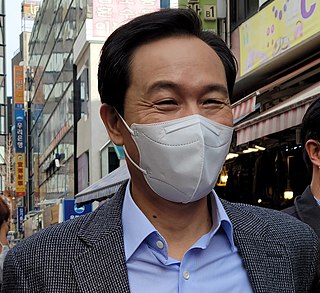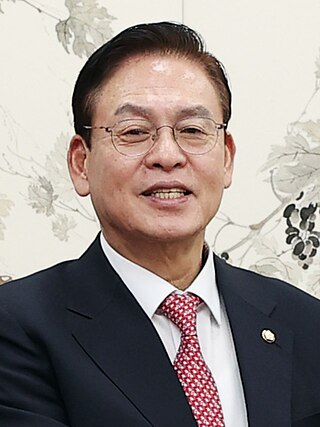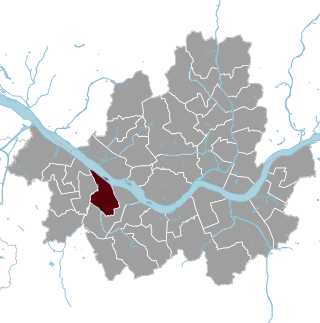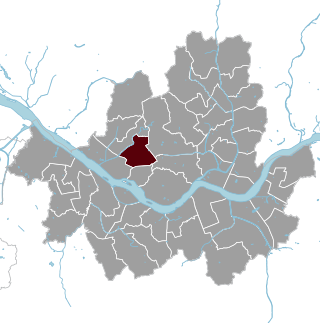
Early presidential elections were held in South Korea on 9 May 2017 following the impeachment and removal of Park Geun-hye. The elections were conducted in a single round, on a first-past-the-post basis, and had originally been scheduled for 20 December 2017. However, they were brought forward after the decision of the Constitutional Court on 10 March 2017 to uphold the National Assembly's impeachment of Park. Following procedures set out in the Constitution of South Korea, Prime Minister Hwang Kyo-ahn succeeded Park as the acting president. After Park was removed from office by the Constitutional Court's ruling, acting president Hwang announced he would not run for a term in his own right.
The Liberal Unification Party, also translated as the Liberty Unification Party, is a far-right, evangelical political party in South Korea established in 2016. Representatives of a range of Christian organizations, including the evangelical Christian Council of Korea and the Communion of Churches in Korea, attended the party's founding convention.

Lee Un-ju is a South Korean lawyer and politician who served as the Member of the National Assembly for Gwangmyeong 2nd constituency from 2012 to 2020. She formerly served as the deputy parliamentary leader of the Democratic Unionist Party in 2012 and the People's Party in 2017.

Lee Sang-kyu is a South Korean activist, labourer and politician. He was the Permanent President of the Minjung Party, a minor left-wing nationalist political party. He was elected as the Member of National Assembly for Gwanak 2nd constituency in 2012 but invalidated by court order in 2014.
The National Revolutionary Party is a South Korean political party formed in 2019.

The People Power Party, formerly known as the United Future Party, is a conservative and right-wing political party in South Korea. It controls the South Korean presidency and is the second largest party in the National Assembly. The PPP, along with its historic rival, the Democratic Party, make up the two largest political parties in South Korea.

The People Party was a political party in South Korea. The party was founded by Ahn Cheol-soo in February 2020, after leaving the Bareunmirae Party. It has the same name as the People Party, which was also founded by Ahn and existed from 2016 to 2018.

The Gihuminsaeng Party, formerly Minsaeng Party, is a conservative liberal political party in South Korea based in the Honam region.

The Pro-Park New Party is a South Korean political party led by Hong Moon-jong.
The Basic Income Party is a single-issue political party in South Korea advocating for a universal basic income (UBI). For the 2024 Parliamentary election, the Basic Income Party formed a coalition with the Open Democratic Party and the Social Democratic Party, called the New Progressive Alliance.

Kim Young-choon is a South Korean former politician serving as the Secretary-General of the National Assembly from June 2020. He was previously President Moon Jae-in's first Minister of Oceans and Fisheries and a three-term parliamentarian. Prior to entering politics, he was an activist at Korea University, where he served as the president of its student union.

Jeon Hae-cheol is a South Korean lawyer and politician who served as the Minister of the Interior and Safety from 2020 to 2022. He formerly served as the Senior Secretary to the President for Civil Affairs from 2006 to 2007, under the then President Roh Moo-hyun.

Park Heong-joon is a South Korean journalist, educator and politician. He was a former professor of the Sociology Department and Graduate School of International Studies at Dong-a University from 1 September 1991 to 12 March 2021.

Woo Sang-ho is a South Korean activist and politician who served as the interim President of the Democratic Party from 7 June 2022 to 29 August 2022. He previously served as the parliamentary leader of the party from 2016 to 2017. He has been the Member of the National Assembly for Seodaemun A constituency from 2004 to 2008, and since 2012.

Chung Woo-taik is a South Korean politician who served as the former Governor of North Chungcheong from 2006 to 2010. He is currently the Member of the National Assembly for Sangdang since 2022.
A by-election was held on 9 March 2022 for the National Assembly seat for Sangdang. It was called following the election annulment of the incumbent, Jeong Jeong-soon, on 1 September 2021. A part of the March 2022 by-elections, this by-election will be held together with the 2022 presidential election.

Yeongdeungpo A is a constituency of the National Assembly of South Korea. The constituency consists of portions of Yeongdeungpo District, Seoul. As of 2020, 187,997 eligible voters were registered in the constituency. The constituency was created in 1988 from the Yeongdeungpo constituency.

Gangbuk B is a constituency of the National Assembly of South Korea. The constituency consists of parts of Gangbuk District, Seoul. As of 2024, 128,295 eligible voters were registered in the constituency. The constituency was created in 1996 after being reorganized from the Dobong B and Dobong C constituency.

Nowon A is a constituency of the National Assembly of South Korea. The constituency consists of parts of Nowon District, Seoul. As of 2024, 224,187 eligible voters were registered in the constituency. The constituency was created in 1988 from the Dobong constituency.

Seodaemun A is a constituency of the National Assembly of South Korea. The constituency consists of parts of Seodaemun District, Seoul. As of 2024, 130,042 eligible voters were registered in the constituency. The constituency was created in 1988 from the Seodaemun–Eunpyeong constituency.

















